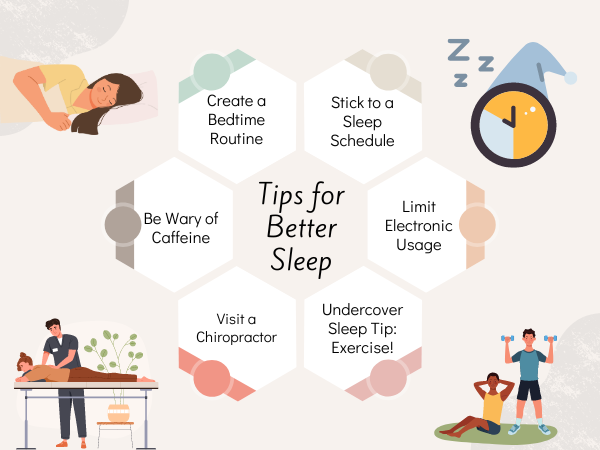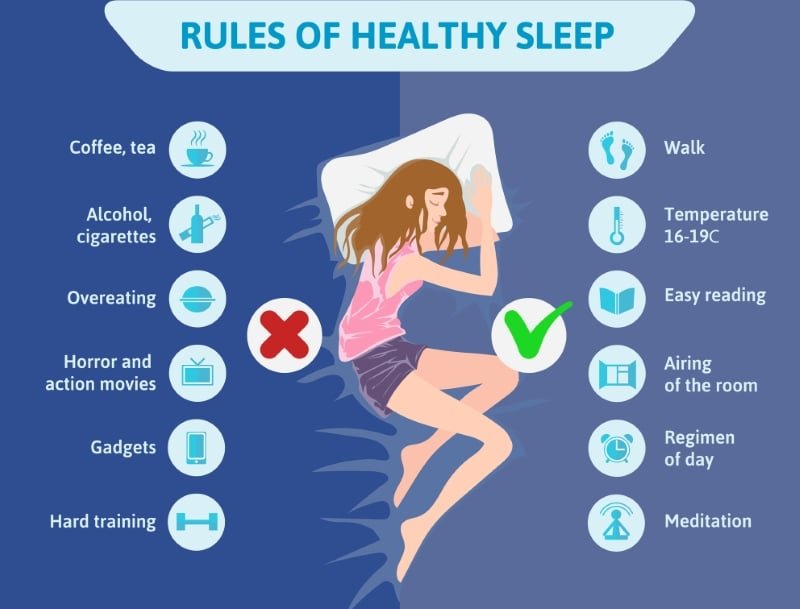Introduction to tips to better sleep
Tips for Better Sleep:Good sleep is vital for maintaining physical health, mental well-being, and overall quality of life. However, many people struggle to get the rest they need. Whether you’re dealing with insomnia or just looking to improve the quality of your sleep, here are some actionable tips to help you achieve better sleep.

1. Establish a Consistent Sleep Schedule:
Your body has a natural sleep-wake cycle, known as the circadian rhythm. To align with this rhythm, try to go to bed and wake up at the same time every day, even on weekends. Consistency reinforces your body’s sleep cycle and can help you fall asleep and wake up more easily.
2. Create a Relaxing Bedtime Routine:
Developing a pre-sleep routine can signal to your body that it’s time to wind down. This could include activities such as reading a book, taking a warm bath, practising relaxation exercises, or listening to soothing music. Avoid stimulating activities and electronics at least an hour before bed, as the blue light from screens can interfere with melatonin production.
3. Optimise Your Sleep Environment:
Your bedroom should be conducive to sleep. Keep the room cool, quiet, and dark. Invest in a comfortable mattress and pillows, and consider blackout curtains or a white noise machine if you’re sensitive to light or noise. Removing electronic devices from the bedroom can also help minimise distractions and disruptions.
4. Pay Attention to Diet and Exercise:
What you eat and drink can affect your sleep. Avoid large meals, caffeine, and alcohol close to bedtime. While alcohol might make you feel drowsy initially, it can disrupt your sleep later in the night. Regular physical activity can also promote better sleep, but try to finish exercising at least a few hours before bed.
5. Manage Stress and Anxiety:
Stress and anxiety are common culprits of poor sleep. Techniques such as mindfulness meditation, deep breathing exercises, and progressive muscle relaxation can help calm your mind. Journaling or talking about your worries with a friend or therapist can also provide relief.
6. Limit Naps:
While naps can be beneficial, long or irregular napping during the day can negatively affect your nighttime sleep. If you need to nap, try to limit it to 20-30 minutes and avoid napping late in the afternoon.
7. Be Mindful of Sleep Disorders:
If you’ve tried these tips and still struggle with sleep, you might have a sleep disorder such as insomnia, sleep apnea, or restless leg syndrome. In such cases, it’s important to consult a healthcare professional who can provide appropriate diagnosis and treatment.
Pros and Cons of Better Sleep Tips

Pros
1.Improved Physical Health:
- Better sleep boosts your immune system, lowers the risk of chronic illnesses such as heart disease and diabetes, and promotes overall physical health.
- Regular, high-quality sleep helps in muscle repair and growth, contributing to better fitness and physical performance.
2. Enhanced Mental Well-being:
- Quality sleep improves mood, reduces stress and anxiety, and helps combat depression.
- Adequate rest enhances cognitive functions, including memory, attention, and decision-making abilities.
3. Increased Productivity :
- Well-rested individuals tend to be more alert and focused, leading to increased productivity at work or school.
- Better sleep helps in maintaining energy levels throughout the day, reducing the likelihood of fatigue and burnout.
4. Weight Management:
- Proper sleep helps regulate hormones that control appetite, reducing cravings for unhealthy foods and aiding in weight management.
- Improved sleep patterns are linked to better metabolism and overall energy balance.
5. Enhanced Quality of Life:
- Consistent good sleep contributes to a higher quality of life, with more energy for social activities, hobbies, and personal interests.
- Better sleep can improve relationships, as you are likely to be more patient, understanding, and emotionally stable.
Cons
1. Time and Effort to Establish New Routines:
- Developing new sleep habits and routines can take time and require consistent effort, which might be challenging for some individuals.
- Adjusting to a new sleep schedule can be difficult, especially if it conflicts with existing obligations or lifestyle.
2. Initial Discomfort:
- Changing your sleep environment or routines might initially cause discomfort or disruption, such as adjusting to a new mattress or altering meal and exercise schedules.
- It may take a few weeks for your body to adapt to a new sleep pattern, during which you might experience temporary sleep disturbances.
3. Potential for Overemphasis:
- Focusing too much on sleep quality can lead to anxiety about sleep, potentially causing more sleep issues, a condition known as orthosomnia.
- Being overly rigid about sleep routines might lead to stress if you occasionally deviate from your schedule.
4. Cost Considerations:
- Investing in sleep aids such as blackout curtains, white noise machines, or a high-quality mattress can be expensive.
- Ongoing costs might include supplements like melatonin or paying for relaxation or meditation apps.
5. Social and Lifestyle Adjustments:
- Adhering to a strict sleep schedule might limit your ability to engage in late-night social activities or spontaneous plans.
- Lifestyle changes, such as reducing caffeine or alcohol intake, might require significant adjustments to your daily habits and preferences.
Conclusion:
Implementing better sleep tips can significantly improve your overall health and well-being, but it requires dedication and sometimes lifestyle adjustments. Weighing the pros and cons can help you make informed decisions about how to enhance your sleep quality effectively. Remember, the benefits of good sleep often outweigh the initial challenges, leading to a healthier, happier life.
you must watch 👁️👁️ this article 👇👇⬇️
What is called a lifestyle lounge? 7 Tips for a Fulfilling Life





